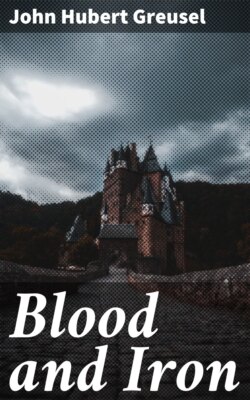Читать книгу Blood and Iron - John Hubert Greusel - Страница 12
На сайте Литреса книга снята с продажи.
ОглавлениеBattle-born, Bismarck’s genius springs from the very fire and sword of human nature—resembling definitely his iron-headed barbarian ancestry, whose freedom remained unconquered through the centuries.
¶ We cannot hope to trace Bismarck to any complete legal basis—any more than we can defend the complete legitimacy of France, Belgium, or the United States, countries avowedly harking back to revolutionary origin. Bismarck’s life, likewise, presents unquestioned elements of anarchistic root. Inherited from battle-born Bismarcks are forces peculiar to himself, free, and individualistic, profoundly expressive wherein Mother Nature summoning her ultimate powers endows a colossal courage in a colossal mind and body.
¶ As far as the Thirteenth Century, the name Bismarck, then styled Bishofsmarck or Biscopesmarck, is associated with the little river Biese; but whence the original stock is for antiquarians to debate.
Believe the Bismarcks to be of Bohemian, of Frankish or of Jewish origin, or of Slavic if you will, you find bespectacled, scholastic authorities who will open the musty pages and display to you the truth.
¶ Herbort of Biese became in due course Herbort von Bismarck. The “von” was unquestionably a mark of geographical origin, rather than a sign of nobility. The name is borne by other families from Biese; but the important part is not the name but the men behind that name, what that name stood for.
¶ Herbort von Bismarck’s name is enrolled in the guild papers as master of the merchant tailors of Stendal, in the old Mark of Brandenburg; a “Mark” being somewhat equivalent to an English “shire.”
¶ But this fact about the tailor-ancestor must not be pressed too far. Some antiquarian of the year 2700 AD, let us say, might argue that President Taft was a steam-shoveler, because the name is found recorded among the laborers who helped dig the Panama Canal; whereas, the fact is that the President was enrolled as an honorary member of one of the labor unions.
Also, after Waterloo, when the British nation was running wild trying to imagine some distinction that as yet had not been bestowed on Wellington, the London tailors in a moment of inspiration added the Iron Duke’s name to the great roll of scissor-snippers!
¶ Beginning with Herbort’s son, four Bismarcks, in three generations, were social lepers.
¶ Klaus von Bismarck died about the year 1385, outside the holy favor of the church—as his father had died before him, and as did two sons, in their turn. But Klaus, ever shrewd in a worldly way, recommended himself as a king’s fighting man; led the robber gang off with the loot in the name of his merry monarch, the Margrave of Bavaria.
¶ For this most excellent service as a professional man-killer, Klaus was rewarded with a knight’s fee of forest land, at Burgstal, an estate that remained in the family for two hundred years. There were deer, wild boar, wolves and bear in the Bismarck forest, and one day Conrad of Hohenzollern came that way on a royal hunting expedition.
¶ Conrad could have stolen the Bismarck petty title outright, but while he confiscated Burgstal forest, he offered Schoenhausen, on the Elbe, in exchange. However, Schoenhausen did not compare with the estate that the envious monarch took by force. The Burgstal forest is to this day one of the great game preserves of the German Emperor.
¶ The Bismarcks also received in the exchange farming land known as Crevisse, lately confiscated by the Hohenzollerns from the nuns; and one of the conditions of the transfer to the Bismarcks was that these nuns should be supported.
